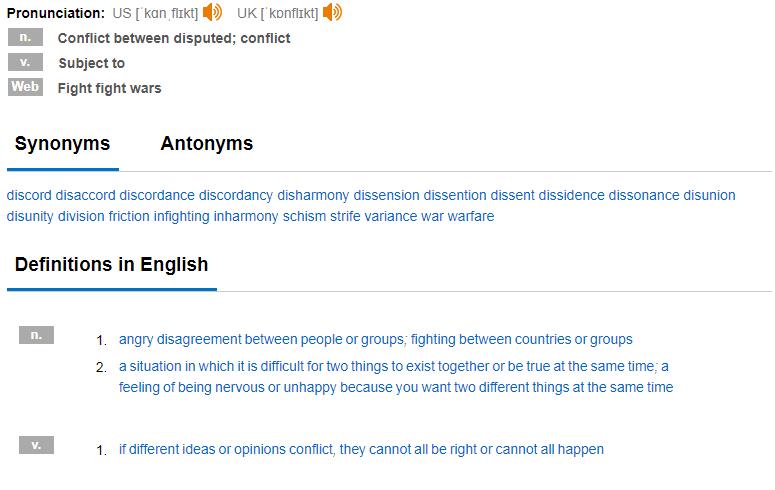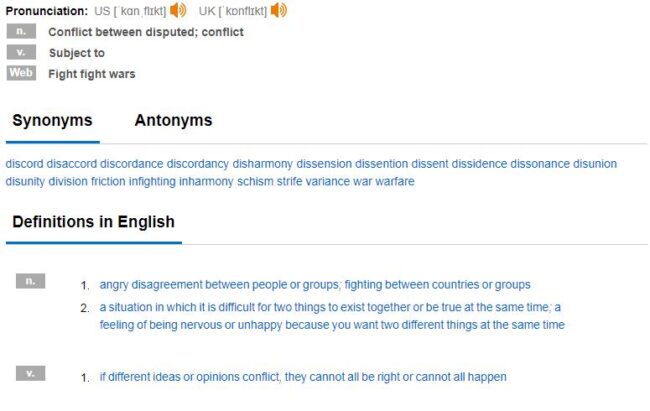The conflict defines the set of two or more hypothetical situations that are exclusive: this means that they cannot occur simultaneously. Therefore, when a conflict arises, there is a confrontation, a fight, a fight or an argument, where one of the intervening parties tries to impose itself on the other.
If we define the term from a simple point of view, we can say that a conflict is a situation in which two or more people do not agree with the way of acting of an individual or a group. For this situation to exist, there must be a disagreement that has not been resolved. For example: If a couple wants to go to a place on vacation and the other to a different place there is disagreement, if they agree to chat and solve the problem by mutual agreement, then the conflict does not occur, otherwise, if no one gives the arm to twist, yes.
According to abbreviationfinder.org, a conflict can involve a confrontation between two people.
The conflict according to Dahrendorf and Marx
For the German Ralf Dahrendorf, a conflict is a universal situation that can only be solved through social change. Karl Marx, for his part, located the origin of the conflict in the dialectic of materialism and in the class struggle.
The existing theories about social conflict allow us to understand the need for a certain order within society, whose members must be integrated. For this, consensus policies must be developed and coercive actions implemented.
Examples where the term may appear: “The conflict broke out when the player refused to occupy the position indicated by his coach”, “The president announced that the border conflict has already been resolved”, “I have a conflict with my father because I arrived late home without warning ”.
The moral perspective
The conflict can be analyzed from various perspectives at the social level. In general, it is understood through morality or justice, with negative consequences since it can destroy or even disintegrate a society. It can be accepted, however, that the conflict has a positive function thanks to its dynamism (it promotes social change).
Outside of politics or sociology, we can understand conflict as something much more everyday and without great effects. A couple arguing over the domestic handling of money, a student confronting his teacher for a bad grade or two friends fighting over football issues will be living a conflict.
When a conflict breaks out between two countries, both sides use weapons to try to impose themselves.
Types of conflict
There are many types of conflicts, one way to classify them is: unilateral and bilateral. A conflict is unilateral when only one party is in disagreement and bilateral when all parties expect something from the other.
Take the case of a tenant who does not pay his rent. If you simply do not do it because you do not have the money, then the conflict is one-sided because the problem is with the landlord, but if you do not do it because you expect the landlord to comply with a certain agreement, such as fixing the heating or a leak, then the conflict it is bilateral because both need something from the other party to feel satisfied.
Causes of the confrontation
For a conflict to occur, there must be underlying causes that can be conscious or unconscious. Somewhere or in some way it has to arise and these causes can be deep or superficial, according to this importance the conflict will be more or less serious. Conflicts always originate from something.
If we return to the conflict of tenant and landlord we can say, if the reasons for non-payment are that the landlord must fix something, then the reasons are conscious, if it is because he has simply begun to forget to pay, there may be an unconscious cause that may have originated for reasons that at first glance do not exist. A hypothetical example could be: the tenant met the landlord at the supermarket and he did not greet him, which was uncomfortable and even annoying. As time went by, he left that anecdote in the past, until the incident presented unconscious causes of a conflict, and led him to stop paying his rent.
Personal or structural conflict
Furthermore, a conflict can be personal or structural. In order to develop personal conflicts, there must be individuals with certain feelings and ideas at stake; while structural conflicts are endemic to specific circumstances in a group of people, they are generic conflicts. In any case, it is not so simple to differentiate them because for there to be structural conflicts it is necessary for there to be individuals who get involved and create the problem.
Within a structural conflict it is necessary that those who intervene manage not to interfere with their own feelings and / or ideas but rather seek the resolution of the problem in favor of the group. This means that the elements in a structural dispute are established in advance. For example, if it is a conflict between two culturally different groups, it must be understood in advance that you cannot try to change the nature of the other party, or their reactions, otherwise you would be facing a conflict that would not have a solution.




